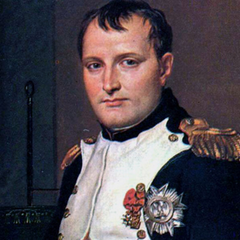More languages
More actions
Emperor of the French Napoleon Bonaparte Napoléon Bonaparte (French) Napulione Buonaparte (Corsican) | |
|---|---|
 | |
| Born | Napoleone Buonaparte 15 August 1769 Ajaccio, Corsica, Kingdom of France |
| Died | 5 May 1821 (age 51) Longwood, Saint Helena, British Empire |
| Cause of death | Stomach cancer |
| Known for |
|
| Field of study | Military tactics and French politics |
Napoleon Bonaparte (né Napoleone di Buonaparte; 15 May 1769 in Ajaccio, Corsica, France – 5 May 1821 in Longwood, Saint Helena, British Empire), also known as Napoleon I or simply Napoleon, was a French military general and emperor of France. He was born on the island of Corsica, rising up the ranks of the French Armed Forces. He participated in the French Revolution, later leading the Coup of 18 Brumaire in 1799 establishing himself as a dictator under the title "First Consul of the French Republic" and ultimately putting an end to the revolution that preceded him.
Napoleon proclaimed himself Emperor of the French in 1804, establishing the French Empire. He invaded and conquered many feudal powers in Europe, nearly bringing the old order to its knees and exporting the bourgeois revolution across Europe in the process.[1][2]
The Marxist understanding of Napoleon is divided as some see him as a progressive who brought feudalism to its knees, whilst others say he betrayed the French Revolution by making himself a dictator and later monarch.[3][4] On top of this, Karl Marx and Friedrich Engels never wrote on Napoleon, but Marx did write against his nephew Louis Napoleon[5] (who himself became Emperor of the French as well). Despite being a progressive force against feudalism, he attempted to recolonise Haiti after the Haitian Revolution[6] and brought back slavery in the colonies.[7]
The Bolsheviks considered Napoleon to be a great revolutionary, stating that "During the Soviet period, the Bolsheviks glorified Napoleon as a revolutionary akin to Lenin, and while that image of him changed after the Soviet collapse, his popularity in some circles remained."[8]
See also[edit | edit source]
References[edit | edit source]
- ↑ Jacques Godechot. "Napoleon I - emperor of France" Britannica. Retrieved 2022-7-4.
- ↑ "Napoleon Bonaparte" (2017-4-27). Biography.com. Retrieved 2022-7-4.
- ↑ Napoleon Between War and Revolution
- ↑ The rise and fall of Napoleon Bonaparte
- ↑ The Eighteenth Brumaire of Louis Bonaparte
- ↑ Vijay Prashad (2008). The Darker Nations: A People's History of the Third World: 'Paris' (p. 3). [PDF] The New Press. ISBN 9781595583420 [LG]
- ↑ "French Revolution". Slavery and Remembrance.
- ↑ Napoleon in Russia: invader turned icon
